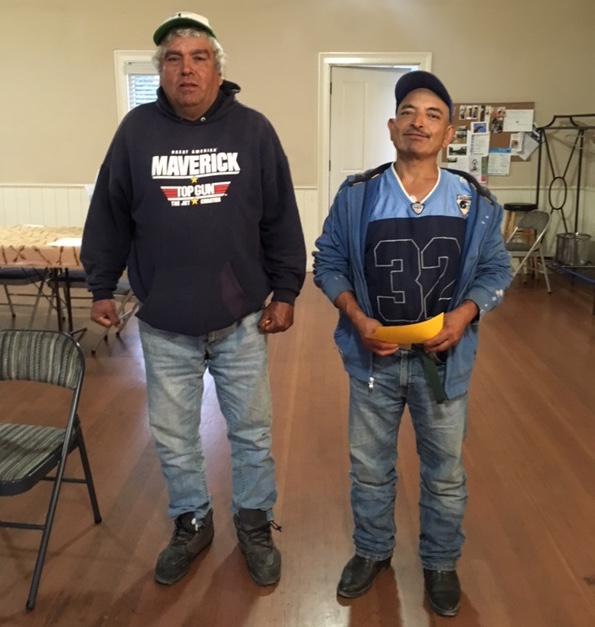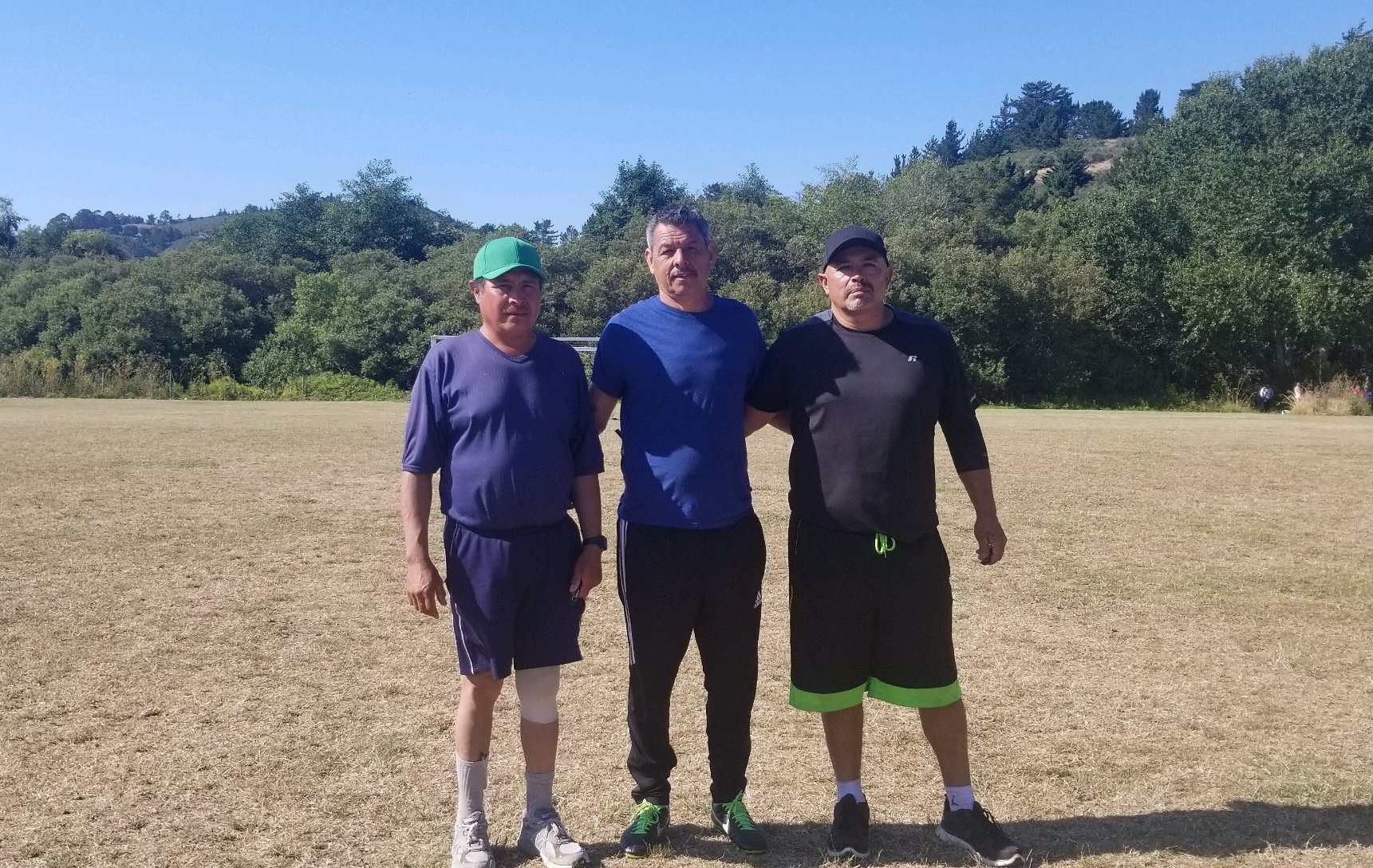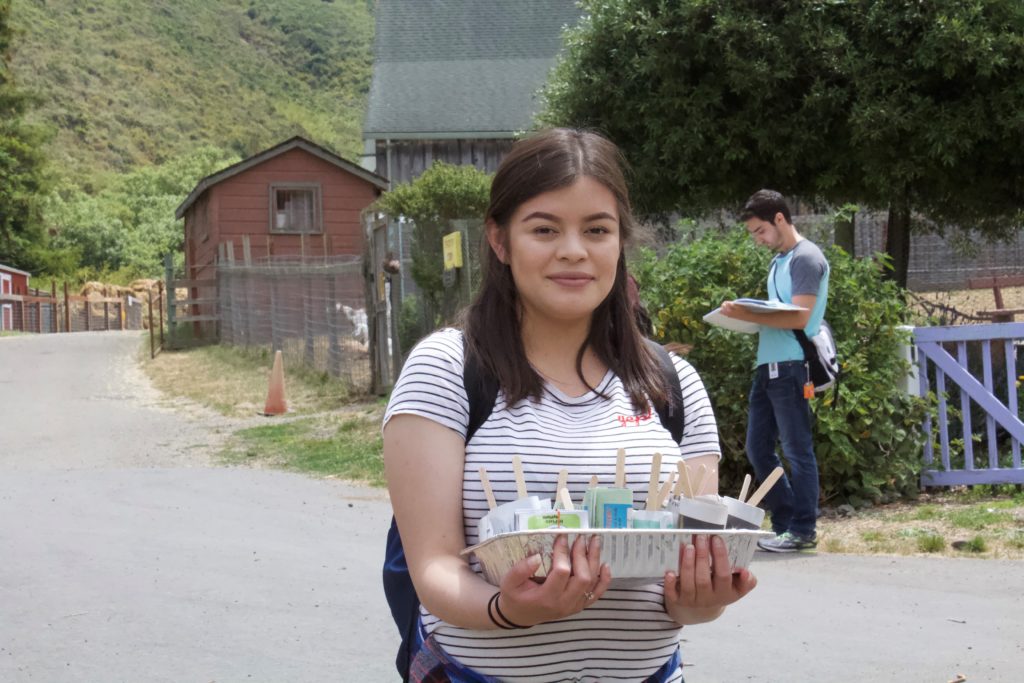
Rubén Ramírez and Abraham Bernardino
Ruben Ramirez and Abraham Bernardino know their vegetables. The men are farm workers who grow and harvest crops on a farm on the San Mateo County Coast – ten hours a day, six days a week. The longest hours are right about now, in the late summer.
Because of where they live, they both spend a lot of time thinking about food – not just growing it, but the complicated process of accessing a variety of foods and ensuring they can afford them.
It’s never a foregone conclusion that all farm workers have access to eating what they grow, and as much of it as they want. In fact, finding affordable, fresh, healthy food can be a major struggle.
“Here in Pescadero, food is expensive – it’s more expensive than the food at the Mexican market in Half Moon Bay,” says Bernardino. He estimates that he spends $300 a month on groceries – a major expense for someone making a few dollars over the minimum wage.
Bernardino and Ramirez have both lived in Pescadero for about a decade, and they both work at a farm on Highway 1 that grows a limited number of costal crops, like Brussels sprouts and artichokes. They live in onsite housing they rent from their employer, sharing space with other single men who have left their homes and families behind to pursue work in this country.
When they can, Ramirez and Bernardino buy food at Puente’s seasonal Pescadero Grown! Farmer’s Market on Thursdays, where qualifying shoppers can get WIC and CalFresh ‘tokens’ that double the value of their cash. Ten dollars becomes twenty, for face-value purchases from local organic farmers.
But the market only lasts through October. And one of the other places that sold groceries within twenty miles, the Pescadero Country Store, burned down in 2016.
Half Moon Bay, Santa Cruz and Watsonville all have markets that specialize in Hispanic food staples. But considering many farm workers get a single day off work – on Sunday – and lack easy access to a car, the simple act of grocery shopping (and visiting a laundromat, as there are none in Pescadero) can quickly become a major ordeal.
Ramirez is one of the only men on his farm who owns a car, and he tries to help his neighbors out as much as possible.
“I drive people around when families need to do shopping, do laundry, or need something to eat,” he says.
Bernardino sometimes rides with Ramirez. “If you don’t have access to a car, you have to pay a taxi to take you where you need to go, and that costs money,” he says.
It’s hard to miss the supreme irony here: that the men and women who grow and harvest everyone’s food, underpaid and underappreciated as they are, would need to go to such lengths to access affordable, fresh, healthy, culturally relevant food. Unfortunately, it is not unusual in California.
In 2016, a report by the policy research group California Institute for Rural Studies found that nearly 50 percent of farm workers interviewed in Yolo County were food insecure, meaning they struggled to get access to healthy food. Residents were living in a “food desert,” with supermarkets up to 50 miles away. Consequently, a disproportionate number of survey respondents were afflicted with diabetes, obesity, hypertension, and anemia.
Previous studies by the same research group found similar results in Fresno County and Salinas.
Aware of these trends locally, and seeing the same diseases proliferate, Puente made access to and education around healthy food a centerpiece if its programming several years ago. Establishing the farmer’s market and the token match program was a big part of that effort, which has the additional benefit of creating a community crossroads and supporting small, hyperlocal organic farmers, ranchers, anglers and other food producers.
Puente has invested in countless other food education programs over the years, which have included workshops and lectures directed at local mothers, as well as cooking classes for youth.
Food and community at La Sala
The single men who work in the fields and nurseries around Pescadero have always been able to count on La Sala, Puente’s oldest program from the earliest days when its mission was defined as a ministry of bicycles, blankets and beans. Twice a week, the men come to the back room of the Pescadero Community Church for a homemade meal and an essential dose of camaraderie that helps alleviate some of the intense isolation that walks hand-in-hand with their lifestyle.
On a recent Thursday at La Sala, Ramirez and Bernardino sat down over hand-assembled burritos to share stories about their favorite foods and dishes to cook – and the efforts they make to obtain the ingredients.
“We both eat healthy. We like being organic,” reveals Bernardino. They like to shop at the Pescadero Grown! Farmer’s Market for ingredients for salads and homemade salsa – tomatoes, onions, and other vegetables of that genre. They also buy artisanal goat cheese and honey from the local vendors.
Ramirez describes his favorite morning smoothie with pineapple, papaya, apple, banana and spinach. Most of the ingredients are a long drive away. “But healthy,” he says. Bernardino likes to make a salad with cucumber, carrots, cabbage and Brussels sprout shavings.
The men occasionally take home Brussels sprouts from their own farm, but they are strict about how much of it they consume.
“One reason we don’t eat off the farm is we see everything that’s added to it. All the pesticides. The produce comes out looking beautiful it is true. The organic produce looks less beautiful, but the flavor is better,” says Bernardino. Puente has begun offering lectures on the risks of working with, and consuming, food coated in pesticides.
The other half of the La Sala equation are the people who volunteer to make meals for the farm workers – an act of generosity that is frequently motivated by a desire to thank the men for their labor and for their role in putting food on the table.
“When I think about how hard these farm workers work, there’s nothing nicer than providing a meal as a way to show them love and appreciation,” says Karen Dittrich, who lives in El Granada. She and her family, including her two daughters, enjoy shopping for groceries and coming up with inventive recipes for the men at La Sala.
Recently, they prepared a chicken marinated with a lemon yoghurt oregano sauce, served with a tomato and feta cheese salad. Her younger daughter made a Bundt cake from scratch. Then the whole family sat down with the men on a Sunday night and enjoyed the meal together.
“It is a joyful way to serve,” says Dittrich.
The men at La Sala especially enjoyed the company (and cooking) of some enthusiastic young students this summer. They were a part of HomeSlice, the food systems internship sponsored by Pie Ranch. For five weeks, the students cooked dishes using ingredients grown on the farm – such as strawberry empanadas made from scratch – and served them at La Sala. They played card games with the men and did their best to chat with them in Spanish. They also learned about a way of life they had never stopped to consider.
“One of the emotional parts we talked about was around visibility and empathy. I think it didn’t register that people are living away from their families in order to have the means to live. I think it make them really grateful that their own families were in one place, working together,” says Kwayera Wilson, the Youth Programs Manager for Pie Ranch.
Ensuring that workers have good food and community is essential. But things won’t really start to change until the farm workers themselves possess the means of food production – meaning, the ability to grow their own food on land they aren’t paid to farm for someone else’s benefit, says Wilson.
“We need a big, open space where people can actually farm that is not production work for someone else,” she adds. “Sometimes when we talk about food access it’s about consumers. It’s rarely about people being empowered to feed themselves.”
If you would like to support program like La Sala to provide healthy and accessible food, please consider donating today.
La paradoja de la comida: la búsqueda de calidad, comida asequible en la tierra de los agricultores
Rubén Ramírez y Abraham Bernardino conocen sus vegetales. Los hombres son trabajadores agrícolas que cultivan y cosechan en una granja en la costa del condado de San Mateo, diez horas al día, seis días a la semana. Las horas más largas son correctas ahora, a fines del verano.
Debido a dónde viven, ambos pasan mucho tiempo pensando en la comida, no solo en cultivarla, sino en el complicado proceso de acceder a una variedad de alimentos y asegurarse de que puedan pagarlos.
Nunca se llega a la conclusión de que todos los trabajadores agrícolas tengan acceso a comer lo que cultivan, y todo lo que quieran. De hecho, encontrar alimentos asequibles, frescos y saludables puede ser una gran dificultad.
“Aquí en Pescadero, la comida es cara, es más cara que la comida en el mercado mexicano en Half Moon Bay,” dice Bernardino. Estima que gasta $300 al mes en comestibles, un gasto importante para alguien que gana unos pocos dólares por encima del salario mínimo.
Bernardino y Ramirez han vivido en Pescadero durante aproximadamente una década, y ambos trabajan en una granja en la carretera 1 que cultiva un número limitado de cultivos costeros, como las coles de Bruselas y las alcachofas. Viven en viviendas en el sitio que alquilan de su empleador, compartiendo espacio con otros hombres solteros que han dejado sus hogares y familias para buscar trabajo en este país.
Cuando pueden, ¡Ramírez y Bernardino compran alimentos en el Pescadero de Puente, de temporada, de Puente! Mercado de Agricultores los jueves, donde los compradores que califican pueden obtener las fichas de WIC y CalFresh que duplican el valor de su efectivo. Diez dólares se convierten en veinte, para compras de valor nominal de agricultores orgánicos locales.
Pero el mercado solo dura hasta octubre. Y uno de los otros lugares que vendía comestibles dentro de las veinte millas, la tienda rural de Pescadero, se quemó en 2016.
Half Moon Bay, Santa Cruz y Watsonville tienen mercados que se especializan en alimentos básicos hispanos. Pero teniendo en cuenta que muchos trabajadores agrícolas tienen un solo día libre el domingo y carecen de fácil acceso a un automóvil, el simple hecho de ir de compras (y visitar una lavandería, ya que no hay ninguno en Pescadero) puede convertirse rápidamente en una gran experiencia.
Ramírez es uno de los únicos hombres en su granja que posee un automóvil, y trata de ayudar a sus vecinos lo más posible.
“Conduzco a la gente cuando las familias necesitan ir de compras, lavar la ropa o necesitan algo para comer,” dice.
Bernardino a veces monta con Ramirez. “Si no tiene acceso a un automóvil, tiene que pagar un taxi para llevarlo a donde necesita ir, y eso cuesta dinero”, dice.
Es difícil pasar por alto la ironía suprema aquí: que los hombres y mujeres que cultivan y cosechan la comida de todos, mal pagados y menospreciados como son, tendrían que llegar a tal extremo para acceder a alimentos asequibles, frescos, saludables y culturalmente relevantes. Desafortunadamente, no es inusual en California.
En 2016, un informe del grupo de investigación de políticas del Instituto de California para Estudios Rurales descubrió que casi el 50 por ciento de los trabajadores agrícolas entrevistados en el condado de Yolo tenían inseguridad alimentaria, lo que significa que tenían dificultades para acceder a alimentos saludables. Los residentes vivían en un “desierto de alimentos”, con supermercados a 50 millas de distancia. En consecuencia, un número desproporcionado de encuestados se vieron afectados por la diabetes, la obesidad, la hipertensión y la anemia.
Estudios previos del mismo grupo de investigación encontraron resultados similares en Fresno County y Salinas.
Consciente de estas tendencias a nivel local y de la proliferación de las mismas enfermedades, Puente hizo que el acceso y la educación en torno a la alimentación saludable fueran una pieza central si se programaba hace varios años. Establecer el mercado de agricultores y el programa de fósforos simbólicos fue una gran parte de ese esfuerzo, que tiene el beneficio adicional de crear una encrucijada comunitaria y apoyar a pequeños agricultores orgánicos, ganaderos, pescadores y otros productores de alimentos hiperlocales.
Puente ha invertido en innumerables otros programas de educación alimentaria a través de los años, que han incluido talleres y conferencias dirigidas a madres locales, así como clases de cocina para jóvenes.
Comida y comunidad en La Sala
Los hombres solteros que trabajan en los campos y guarderías alrededor de Pescadero siempre han podido contar con La Sala, el programa más antiguo de Puente desde los primeros días cuando su misión se definió como un ministerio de bicicletas, mantas y frijoles. Dos veces a la semana, los hombres llegan a la sala trasera de la Iglesia Comunitaria de Pescadero para una comida casera y una dosis esencial de camaradería que ayuda a aliviar el intenso aislamiento que acompaña a su estilo de vida.
En un jueves reciente en La Sala, Ramirez y Bernardino se sentaron a comer burritos ensamblados a mano para compartir historias sobre sus comidas y platos favoritos para cocinar, y los esfuerzos que hacen para obtener los ingredientes.
“Ambos comemos sano. Nos gusta ser orgánicos, ” revela Bernardino. ¡Les gusta comprar en el Pescadero Grown! Mercado Agricultores para ingredientes para ensaladas y salsa casera: tomates, cebollas y otros vegetales de ese género. También compran queso artesanal de cabra y miel a los vendedores locales.
Ramirez describe su batido favorito de la mañana con piña, papaya, manzana, plátano y espinacas. La mayoría de los ingredientes están muy lejos. “Pero saludable”, dice. A Bernardino le gusta hacer una ensalada con pepino, zanahorias, repollo y brotes de Bruselas.
Los hombres ocasionalmente llevan a casa coles de Bruselas de su propia granja, pero son estrictas sobre cuánto consumen.
“Una de las razones por las que no comemos fuera de la granja es que vemos todo lo que se le agrega. Todos los pesticidas. El producto sale luciendo hermoso, es verdad. El producto orgánico parece menos bello, pero el sabor es mejor “, dice Bernardino. Puente ha comenzado a ofrecer conferencias sobre los riesgos de trabajar y consumir alimentos cubiertos con pesticidas.
La otra mitad de la ecuación de La Sala son las personas que se ofrecen voluntariamente para preparar comidas para los trabajadores del campo, un acto de generosidad que con frecuencia está motivado por el deseo de agradecerles a los hombres por su trabajo y por su papel en poner comida en la mesa.
“Cuando pienso en lo duro que trabajan estos trabajadores agrícolas, no hay nada mejor que ofrecer una comida como forma de mostrarles amor y aprecio”, dice Karen Dittrich, que vive en El Granada. Ella y su familia, incluidas sus dos hijas, disfrutan comprando comestibles y elaborando recetas ingeniosas para los hombres de La Sala
Recientemente, prepararon un pollo marinado con yogur de limón con salsa de orégano, servido con una ensalada de tomate y queso feta. Su hija menor hizo un pastel de Bundt desde cero. Luego, toda la familia se sentó con los hombres un domingo por la noche y disfrutaron de la comida juntos.
“Es una manera alegre de servir, ” dice Dittrich.
Los hombres de La Sala disfrutaron especialmente la compañía (y la cocina) de algunos jóvenes entusiastas este verano. Formaban parte de HomeSlice, la pasantía en sistemas alimentarios patrocinada por Pie Ranch. Durante cinco semanas, los estudiantes cocinaron platos usando ingredientes cultivados en la granja, como empanadas de fresa hechas desde cero, y los sirvieron en La Sala. Jugaron juegos de cartas con los hombres e hicieron todo lo posible para conversar con ellos en español. También aprendieron sobre una forma de vida que nunca habían dejado de considerar.
“Una de las partes emocionales de las que hablamos fue sobre la visibilidad y la empatía. Creo que no se registró que las personas viven lejos de sus familias para tener los medios para vivir. Creo que les hace realmente agradecidos de que sus propias familias estuvieran en un solo lugar, trabajando juntas, ” dice Kwayera Wilson, directora de Programas Juveniles de Pie Ranch.
Asegurar que los trabajadores tengan buena comida y comunidad es esencial. Pero las cosas realmente no comenzarán a cambiar hasta que los propios trabajadores agrícolas tengan los medios para producir alimentos, es decir, la capacidad de cultivar sus propios alimentos en tierra, no se les paga para que cultiven en beneficio de otra persona, dice Wilson.
“Necesitamos un gran espacio abierto donde las personas puedan realmente cultivar que no sea un trabajo de producción para otra persona,” agrega. “A veces, cuando hablamos de acceso a alimentos, se trata de consumidores. Raramente se trata de que las personas tengan el poder de alimentarse.”
Si desea apoyar a programas como La Sala para proporcionar alimentos saludables y accesibles, considere donar hoy.


 Danna Gonzalez has been a student on the South Coast her whole life. And most recently, an apprentice, learning about her chosen field of early childhood education alongside experienced teachers who could show her the way.
Danna Gonzalez has been a student on the South Coast her whole life. And most recently, an apprentice, learning about her chosen field of early childhood education alongside experienced teachers who could show her the way.


